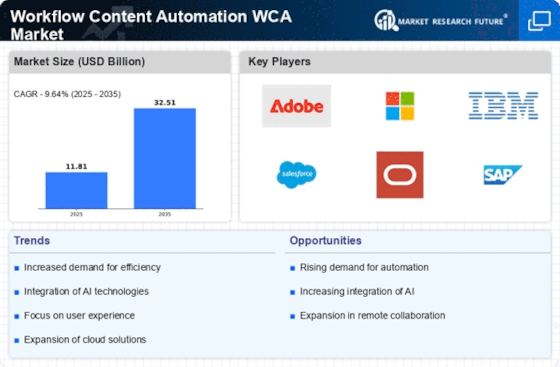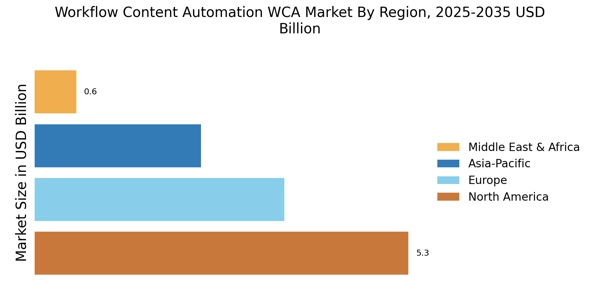Rising Demand for Automation Solutions
The Workflow Content Automation WCA Market is experiencing a notable surge in demand for automation solutions. Organizations are increasingly recognizing the need to streamline operations and enhance productivity. According to recent data, the market for automation technologies is projected to grow at a compound annual growth rate of approximately 25% over the next five years. This growth is driven by the desire to reduce manual tasks, minimize errors, and improve overall efficiency. As businesses seek to optimize their workflows, the adoption of WCA solutions is likely to become a strategic priority. Companies are investing in these technologies to remain competitive, suggesting that the WCA market will continue to expand as more organizations embrace automation as a core component of their operational strategy.
Shift Towards Remote Work and Collaboration
The Workflow Content Automation WCA Market is witnessing a significant shift towards remote work and collaboration. As organizations adapt to new work environments, the need for effective content automation tools has become paramount. Data indicates that approximately 70% of companies are now utilizing remote work solutions, which has led to an increased reliance on WCA technologies to facilitate collaboration among distributed teams. These tools enable seamless sharing of information, streamline communication, and enhance project management capabilities. The growing trend of remote work is likely to drive further investment in WCA solutions, as organizations seek to maintain productivity and ensure that workflows remain efficient, regardless of location.
Increased Focus on Compliance and Governance
In the Workflow Content Automation WCA Market, there is an increasing emphasis on compliance and governance. Organizations are under pressure to adhere to regulatory requirements and industry standards, which necessitates the implementation of robust content management systems. The demand for WCA solutions that facilitate compliance is growing, as these tools help organizations manage documentation, track changes, and ensure that processes align with legal obligations. Recent statistics indicate that companies investing in compliance-related technologies have seen a reduction in audit-related costs by up to 30%. This trend underscores the importance of WCA solutions in maintaining compliance, suggesting that the market will continue to thrive as organizations prioritize governance in their operational frameworks.
Advancements in Technology and Integration Capabilities
Technological advancements are playing a crucial role in shaping the Workflow Content Automation WCA Market. The integration of advanced technologies such as artificial intelligence, machine learning, and cloud computing is enhancing the capabilities of WCA solutions. These innovations allow for improved data processing, real-time analytics, and more efficient content management. Recent market analysis suggests that the integration of AI-driven features in WCA tools can lead to a 40% increase in operational efficiency. As organizations seek to leverage these advancements, the demand for sophisticated WCA solutions is expected to rise, indicating a robust growth trajectory for the market as technology continues to evolve.
Growing Importance of Data Analytics in Workflow Optimization
The Workflow Content Automation WCA Market is increasingly recognizing the importance of data analytics in optimizing workflows. Organizations are leveraging data-driven insights to enhance decision-making processes and improve operational efficiency. The ability to analyze workflow data allows companies to identify bottlenecks, streamline processes, and allocate resources more effectively. Recent studies show that businesses utilizing data analytics in their WCA strategies have experienced a 25% improvement in process efficiency. This trend highlights the potential for WCA solutions to transform how organizations operate, suggesting that the market will continue to grow as companies prioritize data analytics in their workflow automation efforts.

















